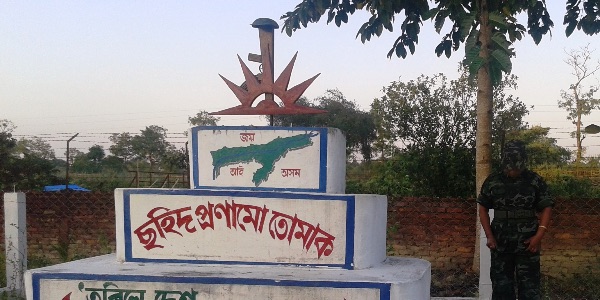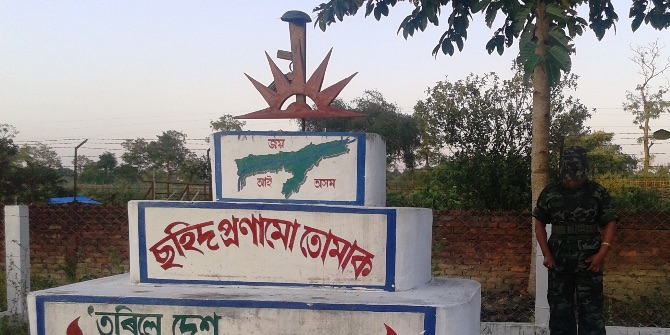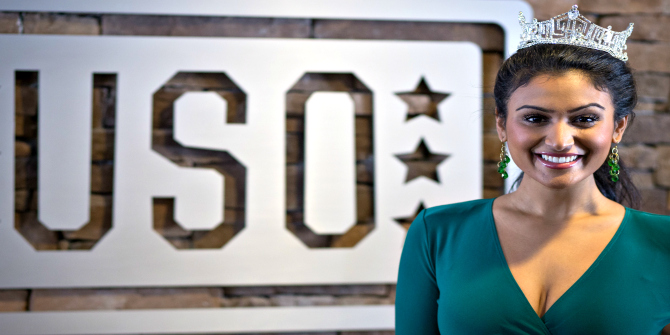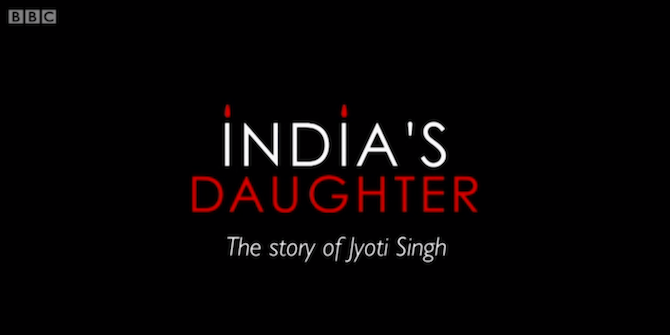 Drawing on research from her MPhil project on the underground lives, activism and representation of women combatants of United Liberation Front of Asom (ULFA), Dixita Deka highlights the position of former female insurgents, who she argues, remain underground in different capacities. It is vital to bring out the missing voices on violence through alternative spaces of resistance including interview transcripts, poetry and diary accounts, she concludes.
Drawing on research from her MPhil project on the underground lives, activism and representation of women combatants of United Liberation Front of Asom (ULFA), Dixita Deka highlights the position of former female insurgents, who she argues, remain underground in different capacities. It is vital to bring out the missing voices on violence through alternative spaces of resistance including interview transcripts, poetry and diary accounts, she concludes.
In 2016, I met writer and publisher Urvashi Butalia at a literary event in the city of Guwahati in the northeastern state of Assam in India. I asked her- ‘What good do the researchers do to women’s lives from conflict zones other than collecting data for fulfilling one’s own research pursuits?’ This question rose in my mind just after completing fieldwork for my MPhil project on the lives of the former women insurgents of United Liberation Front of Asom (ULFA).
ULFA was formed in 1979 at Sivasagar in Assam to challenge the Indian state and establish a sovereign, independent Assam through armed struggle. Despite a series of counterinsurgency operations starting in 90s and numerous internal schisms, the insurgent organization continues to keep its underground activism living along the state boundaries.
Responding to my curiosity and specifically, to my frustration of hearing only underground stories of violence from the former women combatants, Urvashi Butalia replied that it was important to write their stories because they might not otherwise be able to find the space to record and articulate their voices and discontents. Her simple reply actually took me back to the narratives of my respondents in Assam manifested in interview transcripts, diary accounts, and in their poetry.
These alternative spaces mark the dichotomy between a combatant life and a gendered ‘woman’s life’ that tends to occupy the roles of wives/widows/half widows of cadres; caregivers to children and the injured; and providers of sexual pleasure in conflict zones. Yengkhom Jilangamba in his article Sharmila and the Forgotten Genealogy of Violence in Manipur has rightly pointed out that to mis-recognise and misrepresent is also a form of violence, and it perpetuates the already existing militarism. It is indeed worth mentioning that mis-recognition is more dangerous than ignorance. Such mis-recognition is witnessed in the way women in conflict zones are represented in everyday conversations in northeast India or underrepresented in the popular texts on insurgency from the region. I assert this to be violence.
Who were they?
Women in ULFA just like the women of Liberation Tigers of Tamil Elam (LTTE) in Sri Lanka, Maoists in Nepal and along the Red Corridor in India or Irish Republican Army (IRA) in Northern Ireland had strong social motivations to take up arms in 1989. While the decision to make ULFA inclusive came in inspiration of the women cadres in Naga and Kachin rebel organisations, it was a strategic move to integrate the femininity of women to conceal the everyday affairs of militancy. However, it was poverty; violence against women in Assamese society; and extra-judicial killings of civilians and families of insurgents; that provoked the civil women to go underground. For them, it was beyond the politics of geography and self-determination. They considered ULFA as a platform, an opportunity towards fighting human rights violence and promoting human dignity. Their entry into the organisation was either through recruitment drives at an early age or through marital alliances with underground cadres.
Women in ULFA though numerically less than their male counterparts are believed to be more sincere and committed to the task allotted to them. This was a statement made during my fieldwork by many former Commanders of ULFA who had worked closely with the women underground. However, their dynamic lives ceased to be represented both at the organisational level and in the quotidian society above ground.
From mobilising the masses around issues of socio-economic and political exploitation of the region to training batches of new insurgent recruits in the remote territories of Assam, Nagaland, Myanmar and Bhutan, women in ULFA were active in logistics throughout the 90s. While some of them were appointed as political commissars to impart the teachings of Mao-Tse Tung, Lenin and Che Guevara at the camps, there were others who were in the military wing of ULFA until their surrender, arrests or death. However, their active underground lives did not make them immune from violence and vulnerability.

A female cadre at a martyr’s memorial in a designated camp, Sivasagar, Assam. Photo credit: Dixita Deka.
The denied violence
Reading from the back cover of her daughter’s notebook, I heard the first women combatant of ULFA, Tripti (name changed) reciting a poem Seema. I share the poem here with her consent:
| ‘SEEMA’
When the sun rose through the eastern sky, To liberate mother Assam, Hidden in her obedience and silence, A strictly principled Seema, O, ever-adorable revolutionary friend! |
(Translated from Assamese by Kabita Deka and Karabi Dutta on 16th of March, 2017)
This was a poem of mourning and an acknowledgement to women’s martyrdom in the insurgent movement. While the poem highlighted the socially embedded construction of a ‘motherland’, it broke the uniform silence that was maintained over the death of a cadre Seema Bora underground. Poetry emerged as an exploratory space in the search for truth, though in abstract and not in absolute form. It recorded vulnerability, betrayal, exploitation, sufferings, death on one hand and valor, revolution, respect, martyrdom, hope on the other hand. Poetry was one such alternative space of resistance. Quoting another respondent from Sivasagar, an anecdote on state violence was recorded;
“On arrests, women combatants were raped and killed. Civil girls and widows were dragged into army camps and raped. Nobody has a record to that. So girls were married off soon.” (Manisha, 23rd November, 2016, Sivasagar)
From my research with 24 former cadres with numerous rounds of interviews across Assam, it was evident that women in ULFA experienced violence physically, financially, socially and emotionally. While women were equally trained in arms, they were neither sent for combat nor represented in decision-making underground. Above ground, they faced the scorn of the society and continue to bear the brunt of staged surrender ceremonies of the state. Their major concern is to be self-reliant in absence of a well-defined reintegration and rehabilitation agenda. These everyday agonies of survival are either penned down in in conflict time poetry and diaries or are represented as fiction with pseudonyms. Their identities are negotiated underground, over ground, and even in their private spaces.
Today the pro-talk faction of ULFA has signed the Suspension of Operation Pact and has been in continuous peace talks with the state and the central government since 2011. Not even half of its members are represented by the former women cadres. Contrary to this, the underground faction- ULFA (Independent) continues to recruit new cadres especially, from Sivasagar, Tinsukia and Dibrugarh in Assam. Many of whom are women. Yet their voices continue to be missing from the conflict discourse in India and merely remain as a footnote to insurgency.
This article gives the views of the interviewee, and not the position of the South Asia @ LSE blog, nor of the London School of Economics. Please read our comments policy before posting.
About the Author:
 Dixita Deka is a doctoral candidate at Tata Institute of Social Sciences, Guwahati Campus, India. She is currently assisting with a project on trade and gender inclusive inland water transport. Her research interests include peace and conflict studies, gender studies and multiculturalism.
Dixita Deka is a doctoral candidate at Tata Institute of Social Sciences, Guwahati Campus, India. She is currently assisting with a project on trade and gender inclusive inland water transport. Her research interests include peace and conflict studies, gender studies and multiculturalism.







